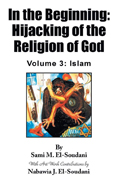
 |
In the Beginning: Hijacking of the Religion of God: Volume 3: Islam
by Sami M. El-Soudani
Westwood Books Publishing, LLC.
In this third volume of El-Soudani’s comprehensive and encompassing research, he demonstrates the efficacy and power of doctrine. While the first two volumes examine Judaism and Christianity, this particular volume provides a birds-eye analysis of a three-thousand-year timeline through the referencing and unpacking of myriad historical and contemporary events that shook and shaped the fundamental pillar of religion and society. The level of objectivity while engaging in critical analysis has the potential to help audiences evolve from laymen to well-informed and engaged individuals. In a world where half the population is comprised of the religions discussed in the three volumes, there is undoubtedly invaluable information combined with a stellar presentation by the author.
One of the core points in this work is the clear distinction between doctrine. Whereas the scriptures of Judaism and Christianity evolve and are presented in various manners, the Qur’an has always remained intact, to the letter. With respect to preventing the “hijacking” of the religion of God, the sanctity and consistency of the Qur’an are the chief reasons that the faith is not compromised at the doctrinal level. However, attempts at attacking the Seven Operating Principles of Islam, akin to the U.S. Constitution, are rampant. Nevertheless, they are just that—unsuccessful attempts.
Though the text is extensive and intricate—an exquisite pleasure for historical researchers—it provides a direct and meaningful flow chart, appropriately called a fault tree, to ensure that all readers are privy to the author’s message. The fault tree analysis is an ideal resource for contextualizing El-Soudani’s argument and evidence while simultaneously delivering a snapshot of a timeline throughout three millennia to demonstrate the attempts at hijacking Islam. For instance, the fault tree indicates that throughout the prophet Muhammad’s lifetime, there were zero attempts at hijacking Islam. However, his death in 632 CE triggered attacks revolving around a call to paganism and false prophets. In one manner or another, be it the attempt at hereditary monarchy—where the crown of the Islamic State would pass from the prophet to his descendants—or empire-building that challenged the second principle, Islam’s operating ideas were continuously put to the test.
At the culmination of the book, the tale of the three monarchs epitomizes humanity. In just a few pages, structured poetically, the three brethren kings infiltrate the mind and exploit religion. Mankind is too quick to manipulate the words of religious scripture, which has parlayed itself onto the global scene with catastrophic events such as September 11th. El-Soudani does a commendable job of adding commentary to 9/11 references to show the perverse and radical nature of Islamic extremism, another attempt at hijacking the religion of God. El-Soudani’s objectivity is never tainted by any other agenda. On the contrary, his referencing of monumental words and events throughout three-thousand years is simply a testament to his research, and his argument stands alone like an immovable pillar. In the context of the religion of God, readers will encounter the Byzantine empire, warnings from President Dwight D. Eisenhower, the Ottoman Turks, Delhi Sultanate, King Farouk and the Egyptian Monarchs, and much, much more.
At first glance, the information presented can appear daunting to digest. As the reader starts to gain some momentum, however, it becomes crystal clear that the author’s division of the text by the seven different principles is an ideal mechanism for easier understanding. In his sharing of research and sometimes dense information, El-Soudani masterfully creates a connection with the reader by proposing and then using his evidence to tackle pertinent topics such as free will. The relationship between God’s will and the will of God’s creation, intelligent human beings, is studied through the lens of an unavoidable discussion in the 21st century of human beings bringing artificial intelligence into existence. Regardless of how intelligent an A.I. can become, the human mind is still superior because it created it. The perspective and study of identifying God and religion are approached from a drastically unique perspective by El-Soudani, and it lends itself to facilitating a strong connection with modern readers. Overall, El-Soudani has an uncanny ability to take complex topics and simplify them through a relatability prism. For history aficionados and aspiring learners alike, El-Soudani’s work is a must-read experience of gargantuan proportions that would serve fittingly as a textbook for university courses on religion.
RECOMMENDED by the US Review